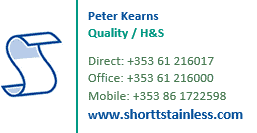Structural Steel & Aluminium CE Marking
EN 1090 for structural steel and aluminium is a requirement for products to be sold in Europe, and any organizations who design and/or manufacture steel or aluminium components must adhere to this standard.
Whether in the form of steel frames or metal roofing, any structural engineers, component manufacturers, and anyone with a hand in the steel or aluminium based components that go into metal buildings/building work, should be aware of this.
EN 1090 is a harmonised standard that covers structural/construction steel and aluminium products that will be installed permanently, for example, in steel frames or metal roofing.
If you design and/or manufacture steel or aluminium components to be sold in Europe, and your products are covered by a harmonised European Standard or a European Technical Assessment, you must CE mark your products.
CE marking to EN 1090 is a legal requirement – since July 2014, structural steelwork and aluminium fall under the Construction Products Regulation (CPR), which means aluminium or structural steel CE marking must be secured to show compliance with EN 1090-1.
Understanding EN1090
Execution Class
The products you produce will fall into a class category, from 1-4, dependent on the activity of your company:
EXC 1
The simplest. It is for structures that carry the least risk to human life in the event of a failure, for example farm buildings.
EXC 2
Typically includes buildings with between 2 and 15 floors, for example smaller, general residential and commercial structures.
EXC 3
For larger residential structures and buildings with more than 15 floors, including pedestrian, bicycle, road and railway bridges, and crane tracks.
EXC 4
The highest risk category due to the increased risk of possible injury covering stadia, power stations and airport buildings. Examples include the sliding roof at Wimbledon Lawn Tennis Club or Wembley Stadium, where a structural failure could have catastrophic consequences, with potential severe loss of life.
Our approach – improving the safety of your products.
QSI will hand-hold your company from start to finish to document and implement a Factory Production Control (FPC) system and have the system certified by a Notified Body. The manufacturer / distributor will also need to produce a Declaration of Performance (DoP). This is a legal document that must be produced by the manufacturer / distributor and supplied with the product(s).

